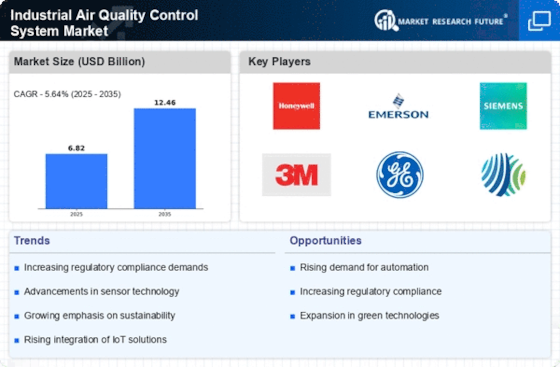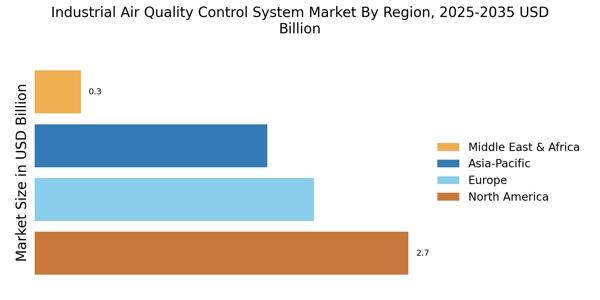The Industrial Air Quality Control System Market is currently characterized by a dynamic competitive landscape, driven by increasing regulatory pressures and a growing emphasis on environmental sustainability. Key players such as Honeywell (US), Emerson Electric (US), and Siemens (DE) are strategically positioning themselves through innovation and technological advancements. Honeywell (US) focuses on integrating advanced analytics and IoT capabilities into its air quality solutions, enhancing operational efficiency and compliance. Meanwhile, Emerson Electric (US) emphasizes digital transformation, leveraging its expertise in automation to optimize air quality management systems. Siemens (DE) is also making strides in this area, particularly through its commitment to sustainable practices and smart building technologies, which collectively shape a competitive environment that prioritizes innovation and environmental responsibility.
In terms of business tactics, companies are increasingly localizing manufacturing and optimizing supply chains to enhance responsiveness to market demands. The market structure appears moderately fragmented, with several key players exerting influence while also facing competition from emerging firms. This fragmentation allows for diverse offerings and innovation, as established companies strive to maintain their market share against new entrants that may disrupt traditional business models.
In August 2025, Honeywell (US) announced a partnership with a leading technology firm to develop AI-driven air quality monitoring systems. This strategic move is likely to enhance Honeywell's product offerings, allowing for real-time data analysis and improved decision-making capabilities for industrial clients. Such advancements not only bolster Honeywell's competitive edge but also align with the growing demand for smart solutions in air quality management.
In September 2025, Emerson Electric (US) launched a new line of air quality sensors designed for industrial applications, which utilize machine learning algorithms to predict air quality fluctuations. This innovation is significant as it positions Emerson at the forefront of technological advancements in the market, potentially leading to increased adoption of their systems among industries seeking to enhance compliance and operational efficiency.
In October 2025, Siemens (DE) unveiled a comprehensive air quality control system that integrates renewable energy sources, showcasing its commitment to sustainability. This initiative is particularly relevant as industries worldwide are increasingly pressured to reduce their carbon footprints. Siemens' approach not only addresses regulatory requirements but also appeals to environmentally conscious consumers, thereby enhancing its market position.
As of October 2025, current competitive trends in the Industrial Air Quality Control System Market are heavily influenced by digitalization, sustainability, and the integration of AI technologies. Strategic alliances are becoming more prevalent, as companies recognize the need to collaborate to enhance their technological capabilities and market reach. Looking ahead, competitive differentiation is likely to evolve from traditional price-based competition to a focus on innovation, advanced technology, and supply chain reliability, reflecting the industry's shift towards more sustainable and efficient solutions.


















